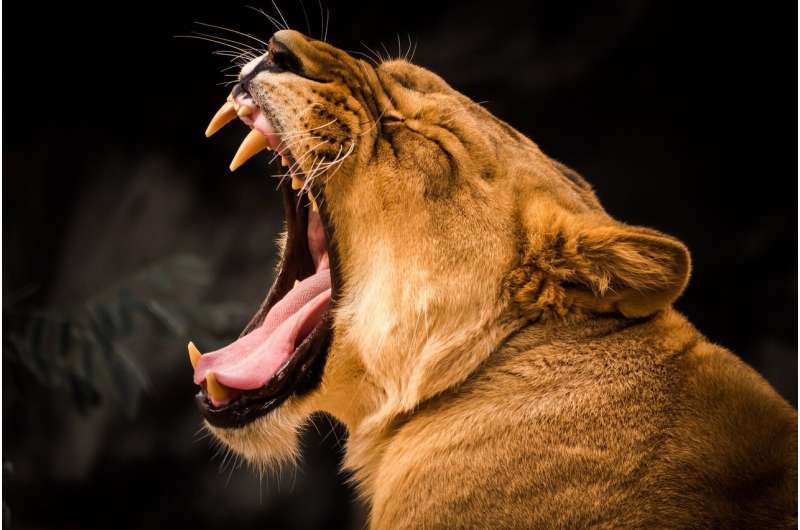April 7, 2021 report
Yawn contagion in lions found to also play a role in social behavior

A trio of researchers from the University of Pisa has found that lions, like many other animals, engage in contagious yawning. In their paper published in the journal Animal Behavior, Grazia Casetta, Andrea Paolo Nolfo and Elisabetta Palagi describe their study of lions living in the wild in Africa and what they learned about their yawning practices.
Prior research has shown that many animals yawn, and as with humans, it results in increased blood flow in the head, which oxygenates and cools the brain—in short, it makes humans and other animals more alert. Prior research has also found that many animals experience yawn contagion—upon seeing someone else yawn, they feel the urge to yawn and do so themselves. In this new effort, the researchers have found that yawning may also have another purpose for some animals.
The researchers began their work by studying hyenas at Greater Makalali Private Game Reserve in South Africa. Hyenas, they note, tend to hang around the same places as lions, which led them to start watching the lions, as well. They found that they could add lions to the list of animals that experience yawn contagion. But they also noticed something else—a lion that copied yawning behavior also tended to copy other behaviors soon thereafter. Intrigued by their finding, they began filming the big cats to see if this behavior was a one-time thing, or a common behavior with lions.
Over a four-month period, the researchers recorded many hours of 19 lions in their natural environment. They paid specific attention to yawning in the videos. They found first that yawn contagion was very common among the lions, as they had suspected. But they also found that the lions tended to mimic behaviors that followed. If one lion yawned, for example, another nearby lion was likely to yawn, as well. Then, if the first lion stood up and walked a short distance, the same lion that had mimicked the yawn would get up and walk a similar distance.
The researchers suggest that mimicking behavior after yawning may be a means for boosting group vigilance in animals that live such a cooperative existence. Boosting collective awareness, they note, could help spot food opportunities or in some cases, to notice threats.
More information: Grazia Casetta et al. Yawn contagion promotes motor synchrony in wild lions, Panthera leo, Animal Behaviour (2021). DOI: 10.1016/j.anbehav.2021.02.010
Journal information: Animal Behavior , Animal Behaviour
© 2021 Science X Network

















